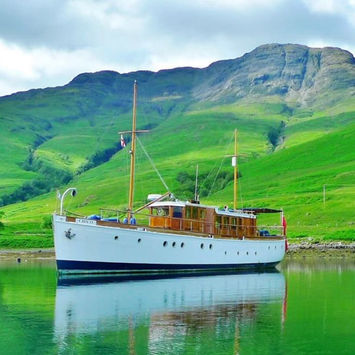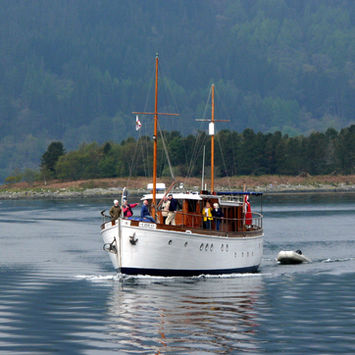Mai - Juin
1940
The Association of Dunkirk Little Ships

A D L S

CHICO

Type: Motor Yacht
Length: 73ft
Beam: 16ft
Draft: 6ft 9ins
Displacement: 74.90 Grt
Engine: 2 x Gardner 6LXB Diesel
Construction: Carvel, pitch pine on oak
Builder: J.N. Miller & Son Ltd, Fife
Year: 1932
HISTORY
Sir Malcolm Campbell, the holder between 1924 and 1948, of several of the world's land and water speed records, owned three fine yachts in succession and named each of them in turn 'Blue Bird' after his famous record-breaking car.
One of these yachts was later re-named Chico. She was a Watson design, built in Scotland in 1932 of pitch pine on oak, with a copper-sheathed bottom and she had luxurious accommodation for ten guests and two crew. Her first owner, Frank Robinson Beavan of Newcastle upon Tyne named her 'Freebelle III'. She was then owned by Sir Malcolm from June 1933 until sold to The Countess of Onslow in July 1935.
On 28th December 1939 she was requisitioned from her for service with the Rear-Admiral, Minelaying Squadron. She was fitted out with echo sounding gear at Camper and Nicholson at Gosport and in January 1940 was then re-named Chico. Her career in the Navy was a particularly illustrious one and is well recorded in her log, preserved from those days.
On leaving the fitting out yard she worked up as necessary at Brightlingsea before proceeding to her base in Dover. Here, as the Chico, she was commissioned on 6th March 1940. In May 1940 it became obvious that the British Expeditionary Force would have to be evacuated from France. At 2130 on 25th May a force of seven trawlers, three yachts (the Grey Mist, Conidaw and Chico), and two drifters sailed for Calais Roads ready to evacuate troops the moment an order to do so was received. Five of the trawlers towed motor boats. Commander W.V.H. Harris, RN (Commander, MS Dover), in the Grey Mist, was in command and the destroyers H.M.S. Windsor and H.M.S. Verity left Dover at 2300 to cover the withdrawal of this force. On arrival off Calais, two of the motor boats were ordered into Calais harbour. At about 0300 on the 26th, a signal was received that Calais was to be held at all costs; furthermore, it was ordered that this signal was to be sent by hand to the Brigadier commanding our forces on shore. The Conidaw went in to deliver the signal. All ships were then ordered back to the Downs.
On 30th May the Chico (under Sub -Lieut. J. Mason, RNVR) left Dover for Dunkirk where she embarked 217 troops and returned to Dover. On the 31st she ferried nearly 1,000 troops from the Dunkirk shore to ships, disembarking a further estimated 100 troops herself on her return to Dover. On 2nd June, she was transferred to life-saving duties on Route X - a new middle route prepared between Dover and Dunkirk, from the North Goodwin to the Ruytingen Pass and thence into Dunkirk Road.
On 20th March 1941 the small ships of the Dover Command assisted in the destruction by the minesweeping force off Dungeness of an enemy bomber, almost certainly a Junkers 88. At about 1400 hours the minesweeping trawler Fyldea, the senior ship, reported an attack by enemy aircraft. The machine dived to attack and was greeted with machine-gun fire from the drifters Young Mon, and Forecast and from the Chico, all serving with the mine sweepers. Possibly the most credit was due to the Young Mon, whose gunlayer, with a single Lewis gun, coolly withheld his fire, but, once he started continued until the plane coming up from astern was within fifty feet. The Chico, two or three hundred yards astern of the Young Mon, and also the Forecast on the beam joined in. The Chico claimed to have shot the tail off when the aircraft was between her and the Young Mon, while the latter put a pan straight into the nose. Whoever was responsible, the Young Mon had her masts carried away and received large pieces of aeroplane on her after deck, the fuselage having, fortunately, disintegrated just before reaching the ship, leaving one engine to fall into the water on each side, with nothing very solid ending up on board. There were no casualties in any of H.M. Ships but none of the crew of the aircraft survived.
On 4th April, while engaged on survey work in the Downs, the Chico again received a little attention from an enemy aircraft. The latter was being hunted by British fighters and let go some bombs which fell not far from the yacht but without causing any damage. Although not seen to crash, the enemy was considered by the fighters to be a 'probable'.
The Chico was compulsorily acquired by the Navy on 7th May 1941. On 15th May aircraft again figured in her life. She had left Dover at about 0800 to work at C2 Buoy, servicing it and fitting a rescue ladder. At about 1510, in the vicinity of C1 Buoy during her return passage, she was close to MTB 50, who was on the opposite course, on passage from Dover to Portsmouth, when each was attacked by a separate aircraft. Two Dorniers appeared out of the cloud and carried out shallow dive attacks. Each aircraft opened fire with machine guns and cannon and dropped five bombs. Several near misses were observed. The MTB in particular had narrow escapes from two bombs within a few feet of her. Though her hull apparently suffered no damage, the MTB was badly shaken up. In the engine room, all her cast-iron engine bearers were badly fractured and all engines were damaged internally. Because of the engine room damage, the power-operated machine gun turret ceased to function and her armament could no longer be used. The Chico suffered no damage, only the disappointment of having the best of her many guns, a 20mm cannon, jammed as a result of excessive zeal in over-charging the magazines.
Fortunately, there were no casualties in either boat, but it was a pity that neither was able to take advantage of an easy target, although the Chico claimed some hits with tracer from the more ordinary part of her armament. Both aircraft made off, apparently undamaged. MTB 50 was taken in tow by the Chico and brought safely back to Dover, which was reached at about 2030 without further incident, thanks no doubt to a close escort provided by three fighters. The Chico continued her activities without incident, but on 4th June 1942 she sustained minor damage when she collided with some MTB pens, breaking her sternpost and her covering board and all her planks from the deck to one foot above the water line. On 29th July, with a demolition cutter, she commenced work on the wreck of the trawler Tranquil which sank as a result of a collision in the Downs and was a hazard to navigation. On 5th January 1943 the Chico paid off and de-stored for an engine overhaul and was taken in hand at the London Graving Dock, Poplar. In February she was re-allocated for service with the Royal Naval College, Greenwich, but in April 1943 she transferred to the Medway Mine Watching Patrol based at Chatham. There she remained until 16th February 1945 when she was laid up at Mears yard, Twickenham under the Director of Sea Transport's care and maintenance arrangements. She was disposed of in August 1946.
After the war she had a number of civilian owners, some of whom used her as a charter yacht.
After a major restoration commenced in the Autumn of 1997 by the previous Association Archivist CHICO changed hands again in 2010 and is now based in Scotland.
Extract taken from: ‘Gunboat Command’, the Biography of Lieutenant Commander Robert Hichens DSO* DSC** RNVR by Antony Hichens.
https://amzn.eu/8wpGnU8
“I had realised when I was on the beach that we were being machine gunned from time to time and hadn’t taken much notice, being too busy, but I had entirely failed to notice that we were being shelled from Nieuport, further east. It appears that the weather having cleared about noon, a German battery at Nieuport had opened up. Anyway, shells began to drop all around the Chico. They have that unpleasant ‘wheeze’ and then bang. They straddled us in every direction but luckily never hit us, as a shell would have finished the little Chico. Meanwhile I was helping hoist the anchor and finally by being lowered over the stern managed to clear the rope off the propeller fairly well, so that she was able to proceed at a slow speed, about five or six knots. I felt pretty bad about leaving those soldiers on the beach, but I had done my best and could do nothing further and I had at least told them what to do. I think I must have got about five hundred to seven hundred troops off that day through my exertions, who might never have embarked otherwise. It seemed really a worthwhile effort, but as I lay on the deck of the Chico resting it was not the thought of the shells falling around that worried me, but the haunting spectacle of those soldiers quietly waiting for help. It is nice to know now that those that were not killed on the beaches were ultimately taken off. We slowly proceeded west and had got about half a mile when suddenly the worst bombing attack of the day took place. About twenty German bombers came over and dropped about forty or more bombs, I should judge. They were evidently aimed chiefly at the beaches but fell short in to the edge of the water, causing a terrific noise and clouds of smoke along the fringe of the beach. Some British fighters appeared almost immediately, and a dog fight ensued. Presently two planes crashed, one with terrific violence into the sea and the other over the land. Two parachutists dropped, one into the sea and another behind the sand dunes. I could not be sure whether they were both German planes but at any rate the Germans left us again promptly. It was exciting while it lasted. The next little excitement was that a fat and cheerful member of the crew leaning against the guard rails suddenly caused a part of it to give way and in he went with a splash. We picked him up alright. After that we made our slow way back without further incident, arriving in the submarine basin at Dover about midnight. It was quite like being back in the old yachting days on Chico, everything was so informal and small again. They were a nice lot of chaps too. I got a bath at the Grand Hotel and slept on a sofa, as the whole of Dover was full.”







